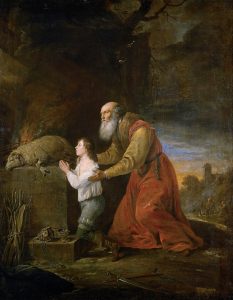First Reading (Track One): Genesis 22:1-14
It is not our faith that saves us, but God’s faithfulness to us: Hear this theme through Sunday’s Lectionary readings.

Abraham’s Sacrifice (1653), oil painting on canvas by David Teniers the Younger (1610-1690). Kunsthistorisches Museum, Vienna, Austria. (Click image to enlarge)
In our Track One first reading, Abraham hears a shocking command: God tells him to slay his beloved son Isaac as a sacrifice. It’s hard for us to imagine a God who would order such a thing, but we rejoice with Abraham when God forbids him to kill Isaac after all, offering a ram to sacrifice instead. As an ancestral legend, this event established in law that the people should not sacrifice humans. It showed a compassionate God, once Abraham’s faith was tested: a God who would say “no” to the death of Isaac and “no” to death again in the resurrection of his own son, Jesus Christ.
First Reading (Track Two): Jeremiah 28:5-9
To place this short reading in context, go back and read the verses just before it. Jeremiah had warned the priests and people that their exile in Babylon would not be ending soon, and that any prophets who say otherwise are liars. Then the young prophet Hananiah stood up and challenged that, prophesying that God had in fact broken the yoke of the Babylonian king and would bring all the exiles home within two years. Now in Sunday’s reading we hear Jeremiah respond. HeOU agrees that God will indeed end the exile some day, but only when peace prevails and war, pestilence and famine come to an end.
Psalm (Track One): Psalm 13
The opening verses of this short Psalm might not seem appropriate to comfort a person who is grieving or afraid. But it does provide insight into the profound pain that exists at the depths of fear and loss. It would be only too human to be afraid that we have been forgotten, that God’s face is turned away and hidden, leaving us defenseless and alone, victim to our enemies. But even in utter darkness, the Psalmist assures us, hope remains when we trust in God’s mercy. God has dealt with us fairly, and we can take joy in God’s saving help.
Psalm (Track Two): Psalm 89:1-4,15-18
In these two brief excerpts from a longer Psalm, the Psalmist celebrates God’s covenant with King David as a royal lineage that God established to last forever as a sign of God’s righteousness and never-ending rule. Those who walk in God’s way and rejoice in the divine name will be full of joy, the Psalmist sings, for they know that God is their ruler. The Holy One of Israel is everlasting king.
Second Reading: Romans 6:12-23
Who would want to be enslaved? It is hard to imagine anyone who would willingly embrace this state, as Paul makes clear by using the idea of enslavement to make a telling point: Our baptism spares us from the enslavement of sin, freeing us to embrace a better way: the joyful enslavement of willing submission to God through Christ. In this way, Paul says, we receive the free gift of grace that brings eternal life.
Gospel: Matthew 10:40-42
This Sunday we hear the third and final passage from Matthew’s long account of Jesus teaching his recently commissioned apostles about the challenges and rewards of discipleship. In recent Gospel readings we have heard Jesus’s troubling warnings about how he came not to bring peace but a sword, and that his followers must leave friends and family behind in order to follow him. But now at last Jesus turns his attention to the rewards of following his way. Echoing the Psalmist’s assurance that God is loving, just and fair, Jesus promises that those who practice justice in God’s name – even in such small ways as offering water to a child – will earn their reward.
